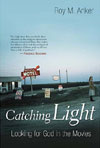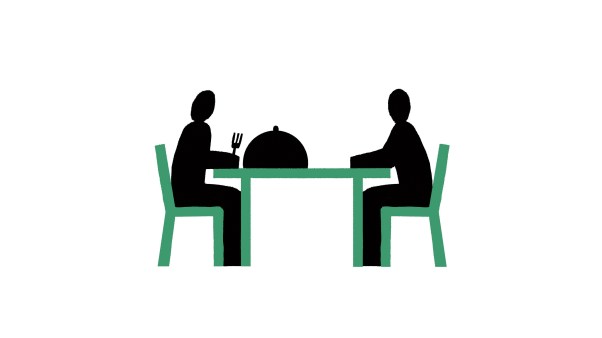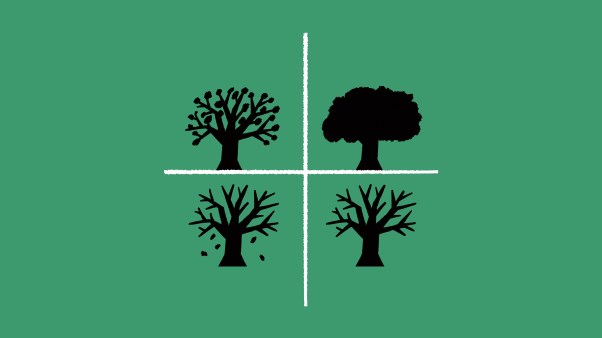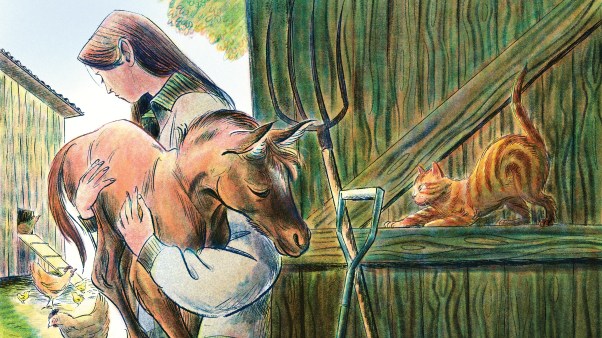Monday’s segment ended with Luke “gazing at the horizon, yearning for who knows what” as he considers Obi-Wan’s radical offer to come with him to learn the ways of the Force—and take his first step toward becoming a Jedi knight. But Luke is unconvinced about the eccentric old man’s “damn fool idealistic crusade,” when suddenly comes “this chance, out of nowhere, for more adventure and life than Luke ever imagined.” That’s where we pick up the story …
There is the strange droid Luke’s uncle buys; the meeting with Obi-Wan and the secret message from a captive princess; Obi-Wan’s history and his own father’s history; the strange potent something called the Force (the audience has already seen it operate in Obi-Wan’s healing of Luke and Darth Vader’s vengeance on a skeptic of its powers); and the possibility of leaving home to become, of all things, a “knight.” That’s a lot of news for a young fellow on an ordinary morning on Tatooine to absorb, and Luke is understandably wary. But, whatever reasons he has for his reluctance to follow Obi-Wan, they disappear when he returns home to find his aunt and uncle slain by the storm troopers of the Empire, who have tracked the escaped droid R2-D2 to this planet. Now nothing remains for Luke where he has grown up. Perhaps seeking revenge for the destruction of his home, Luke decides to ally himself with crazy Obi-Wan Kenobi.
So begins Luke Skywalker’s long struggle: it is on one level a splendid martial contest, with light sabers and star fighters and plain old guts, but that is not nearly the half of it, as the audience soon discovers. For the rest of the film Luke will roam the cosmos, suffer many close calls, and meet a host of new friends; but no part of his experience proves more crucial than his decision, in the midst of the star fighter attack on the Empire’s Death Star, to turn off his targeting computer and trust the Force to guide his natural instincts. The result is triumph, and a grand victory celebration follows, one that will be reprised in even grander fashion at the end of The Return of the Jedi and also at the end of Episode I: The Phantom Menace (1999), which is where the whole grand story starts (the Jedi knighthood’s discovery of a young Anakin Skywalker, Luke’s father).
The truth is, as The Empire Strikes Back (1980) makes clear, what tentative trust in the Force’s reality Luke has found at the end of Star Wars is insufficient to defeat the dark might of the Empire. It sufficed to destroy the Death Star and foil the Empire in this one encounter, but that victory, both spiritual and military, amounts to little when measured by the scope of the military and spiritual struggle that lies ahead. This is especially true of Luke’s understanding of the religious reality that infuses his world: he has much to learn about the Force, especially its very nature, to which the first installment in the original trilogy offers but the barest introduction. In that film Lucas was concerned primarily with the necessity of belief in the numinous reality of the Force; that vital leap of faith allows Luke to destroy the Empire’s Death Star.
The depth of the Force
In The Empire Strikes Back, Lucas continues to push the necessity of that belief but expands his treatment of the Force to dramatize its essential character, elements only hinted at in the first film. This shows the Force as something other and more than mere force or supernatural power. Through the teachings of Yoda, the Jedi master who has trained Jedi novices for centuries, Lucas imbues the Force with a notably deeper and richer personality. It soon becomes clear—again to Luke’s astonishment—that there is unfathomably more to the Force than mere power for human exploitation. The Force does not simply flow into people for them to use for whatever purposes, much like positive thinking’s assertions about reservoirs of divine power that aid people if they simply believe in them.
The Force is far more than another weapon for the macho superhero to add to his blaster-belt; rather, it has a very demanding spiritual and moral content. Believing in the Force is easy enough, especially after witnessing its power, as Luke already has; it is quite another matter to understand and embrace—in short, to live—its deepest intentions. These purposes boil down to two inextricable components, though Lucas never uses these specific terms, no doubt for fear of making his script hackneyed, sentimental, or overtly moralistic. While the Force first counsels “faith” in the reality of its abiding presence and power, its inmost character is far more than power for human disposal. What it is really about is radical love for all things, a posture its devotees must take deeply into themselves if they wish to become full-fledged Jedis. Beyond all the blasters and monsters and space heroes, the genius and ultimately the lasting appeal of the Star Wars saga lies in Lucas’s ability to dramatize the necessity, cogency, and poignance of this sacred existential posture in both the lives of his characters and the history of their fictional galaxy. Ultimately, the history of the universe depends not on Luke Skywalker’s physical brawn, combat prowess, or strategic wiliness but on the extent to which he has imbibed the lessons of love.
An unlikely warrior-mentor-master
This emphasis gathers steam and clarity in the story of Luke’s formal training for Jedi knighthood in The Empire Strikes Back, which is the most imaginative and visually stunning of the five Star Wars films so far. From an eerie ice planet invaded by giant attack walkers, the story leaps to its opposite, the steamy bog of Dagobah, the home of the solitary Yoda, the unlikeliest warrior-mentor-master ever concocted. Once again, these never-dreamt-of worlds took viewers by utter surprise and gave enormous delight when that movie came out. And here on Dagobah, Lucas shows for the first time just how weighty his intentions about myth, plot, and the significance of religious belief are, specifically as they play out in Luke’s struggle.
Far from being a superior Jedi hero, the impression given at the end of Star Wars, Luke is shown in The Empire Strikes Back as still very much the same callow youth he was at the beginning of his story back on Tatooine. And he is, to be sure, still very much a novice in opposing evil—and not a promising one at that. He has a great deal to learn, all of it spiritual, and his growth depends wholly on his comprehension and acceptance of the nature of the Force. The Force has moved from a largely magical plot gimmick, a deus ex machina contrivance, to a complex conception that within its posture of love demands an attitude of nonaggression—an odd, even paradoxical, stance for would-be warriors. It is emphatically clear that the only hope for combating the evil Emperor and his dastardly henchman, Darth Vader, lies in this posture of nonaggression.
The primary focus, then, of The Empire Strikes Back is the education of Luke Skywalker in the nature and ways of the Force, which in Lucas’s vision are one and the same. Along the way, audiences not only learn more about the character of the Force, needless to say, but also see at length the character of Luke, the impatient angry one. The spirit of the dead Obi-Wan Kenobi (who sacrificed himself in Star Wars to help Luke) has told Luke to journey to a mysterious planet to seek a Jedi master named Yoda, teacher of candidates for the Jedi knighthood. Once there, Luke finds the second great surprise on his path to Jedihood, and it is one shared by viewers, since we have been influenced by many of the same glib attitudes about power and majesty that Luke has imbibed. If Luke is surprised by the reality of the Force in Star Wars, here he is surprised by its character.
His typical childish notions of the Force as simple power and domination lead him to expect a resplendent mighty warrior, a shining John Wayne figure. Instead, in his first lesson about the nature of the Force, he finds the unlikeliest of figures, the last sort of creature one would envision as a teacher of warrior knights, one who seems to be the very antithesis of power. This Jedi master stands two feet tall, is green, reptilian, has big pointed ears, frog-like eyes, and a raspy voice, and, as he limps along with a staff, is clearly aged. Living where and how he does, Yoda is notably humble and “unworldly,” so much so that in his homely, comical looks and voice, his lack of physical might, and the obscure remoteness of his home he echoes the prophecies of Isaiah about the coming Messiah. If Yoda is indeed who he seems to be, then the last are indeed first, the humble are exalted, and the obscure are the luminaries.
This all becomes clear when, in that second great surprise in the saga, Yoda suddenly reveals himself as the Jedi master he is. Luke has allowed himself to be sheltered and fed by the impish creature because this troublesome little being, looking for all the world like an overgrown frog, has promised to take him to Yoda, the Jedi master. Luke has taken so little note of him that so far he hasn’t even bothered to ask his name, even after Yoda has ministered to him, just as Obi-Wan did at the beginning of Star Wars. Luke is a slow learner, but the painful joke and lesson is on him when Yoda finally reveals himself, complaining aloud to Obi-Wan, whose spirit in turn answers. Upon hearing Obi-Wan’s voice, Luke is for once dumbstruck as the camera cuts to Yoda: the small creature straightens up from his habitual stoop, and the camera takes in his resolute look of quiet, profound dignity. During this brief episode, Yoda’s demeanor plays directly off Luke’s—and the viewers’—glib presumptions about the nature of power. (The centrality of these character roles to the thematic core of the films justifies Lucas’s extraordinary pains in keeping plot details absolutely secret until the film’s release; much of his point would have been lost if audiences had known beforehand that the Jedi master was a frog.) The humble obscurity of Yoda speaks volumes about the nature of the Force that Luke must come to understand.
Putting on a new mind
Luke’s chagrin is just a foretaste of what is to follow. Yoda’s lessons for knighthood consist, not of better sword play or karate, but of humility, patience, tolerance, calm, and trust, a group of traits starkly opposed to those Luke manifests and, to some extent, venerates. In effect, Luke must put on a new mind and see himself and the world as never before, or go further into a “larger world,” as Obi-Wan Kenobi bade him in Star Wars. To succeed, Luke must put aside fear, anger, and aggression, which constitute, Yoda emphasizes, the sure path to the dark side and all the usual meanness of the world.
Always, Yoda tells him—and Lucas repeats insistently in the subsequent films—these sensations and attitudes precede the act, the actual doing of evil. To feel these, then, is already to have started down the path that leads to evil, darkness, and damnation. This ethical-spiritual matrix Yoda puts most succinctly in The Phantom Menace, where he tells ten-year-old Anakin Skywalker, Luke’s father, that “fear is the path to the dark side. Fear leads to hate, and hate leads to suffering.” Here Lucas simply echoes Jesus’ repeated counsel for spiritual purity in all aspects of life, from sexuality to hostility.
Along with this counsel of love for all things, Yoda advises Luke to revere the spiritual and intrinsic goodness of all life, which is an extension of recognizing the reality of spirit and the Force as continuous interdependent realities. In his most eloquent speech in The Empire Strikes Back—and perhaps in the whole saga—Yoda insists that we are not “crude matter” but “luminous beings,” and Luke must arrive at the place where he embraces this truth. In Lucas’s fictional universe, spirit controls the very limits of physical reality, and those trusting the Force, either its dark or light side, control and direct matter as they wish. Spirit runs the world, not physical size and might, as the tiny Yoda shows when he, by the power of his soul, raises Luke’s submerged star fighter from its mucky home in a bog. During his long and difficult training with Yoda, Luke begins to absorb these truths, though he still has a long way to go before he can overcome the concentrated evil of the Emperor and Darth Vader.
Reprinted from Catching Light: Looking for God in the Movies (Eerdmans). Used by permission. To purchase a copy of Catching Light, click here.
Copyright © 2005 Christianity Today. Click for reprint information.









